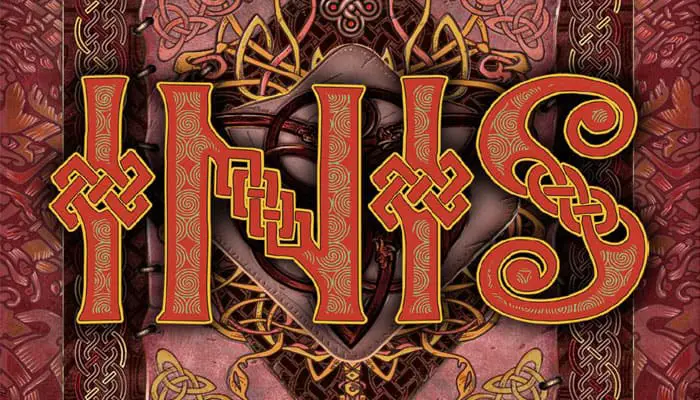
Inis takes place during the height of the ancient Celts, when history and legend are one and the same.
Players are chieftains leading their clans beyond the seas from Ireland to a newly discovered island. They settle the land, explore the surrounding area, harvest resources from the mines, and construct Citadels and Sanctuaries for their protection.
Bards recount the tales of their gods and heroes, druids act as advisors, and master craftsmen immortalize Celtic civilization.
Each chieftain believes to have the most legitimate claim to the throne of this new island. Only time will tell who among them will ascend to become Ard-Ri, the High King of this new realm!
Each game round consists of two phases. First is the Assembly Phase, during which players check for victory, determine who the chieftains are, and draft Action cards. Next is the Season Phase, during which players play cards from their hand.
Important: In Inis, the only way a player can perform any action in the game (placing new clans, moving clans, building Sanctuaries, etc). is by playing a card. Because of this, which cards you draft during the Assembly phase is essential to you winning the game.
Object of the Game
Players aspire to become elected High King over their new land. Each round, players check to see if a player has been elected. To be elected, a player must fulfill the most victory conditions:
- Be present in six or more territories.
- Be chieftain over a combined total of six or more opposing clans.
- Be present in territories with a combined total of six sanctuaries.

Components
- 18 Buildings
- 1 Capital
- 8 Citadels
- 9 Sanctuaries
- 67 Cards
- 17 Action Cards
- 16 Advantage Cards
- 30 Epic Tale Cards
- 4 Reference Cards
- 16 Territory Tiles
- 15 Tokens & Markers
- 1 Brenn Marker
- 1 Flock of Crows Token
- 4 Pretender Tokens
- 8 Deed Tokens
- 1 Festival Marker
- 48 Clan Figures (12 in each color)
Territories
A new territory is always placed adjacent to at least two territories. When a new territory is placed, its matching Advantage card is taken from the Advantage deck and placed faceup by the play area.
Clans
Each figure is a clan. Each player has 12 figures of one color. There are multiple sculpts, but the different sculpts do not affect gameplay. If a player has all 12 of his figures on the board, he cannot recruit more clans until some of them have been returned to his reserve.
Buildings
There are two building types: Citadels and Sanctuaries. There is no limit to the number of buildings a territory can contain. If a player attempts to place a new building in a territory, but there are no more buildings of this type in the reserve, he cannot place this type of building.
Buildings do not belong to any player in particular.
Citadels
Citadels allow players to protect their clans during clashes. Each Citadel has space to hold one clan during a clash (see page 8). One Citadel is larger than the others: it is the Capital
Sanctuaries
Sanctuaries are necessary to achieve one of the victory conditions.
Tokens & Markers
Brenn
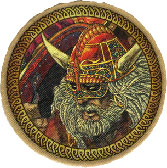
The Brenn is a temporary leader until someone is appointed High King. He is randomly determined at the start of the game, and during each Assembly phase the title of Brenn is passed to the Capital territory's chieftain. The Brenn organizes the Assembly and, at the end of the game, has an advantage in case of a tie with another player.
Flock Of Crows
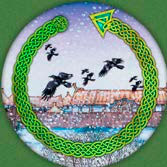
This token shows which direction to resolve turn order: clockwise or counterclockwise.
It is tossed by the Brenn during each Assembly.
Pretender
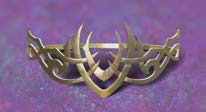
When a player meets a victory condition's requirement, he takes one Pretender token to show that he is a pretender to the throne. Only players with a Pretender token can attempt to claim victory during the Assembly.
Deed

A Deed is earned through Action or Epic Tale cards. A Deed is a "wild", which allows a player to supplement a victory condition
Festival

This marker is used when the "Festival" Action card is played during the Season phase.
Cards
Each card has a specific type (Action, Advantage and Epic Tale), timing icon (Season or Triskel), and effect. Players keep cards in their hand secret from their opponents, but the number of cards in their hand and which card types (visible on the card backs) is not secret.
Players discard cards after playing them.
Timing (icon in top-left corner) There are two different icons that indicate when a card can be played. Each card has at least one of these icons, and some cards have both:
Season cards are played during the Season phase on the owner's turn.
Triskel cards indicate a specific timing when they can be played.
Card type (indicated by the card's color)
Cards are divided into three types : Action , Advantage and Epic Tale . Each card is acquired in a different way according to its type:
Action Cards
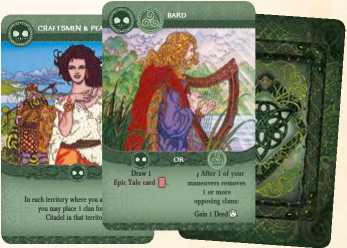
During the Season phase, an Action card allows a player to perform important actions such as recruiting new clans or placing new Sanctuaries.
How to Acquire: These cards are drafted during the Assembly phase at the start of each round.
Allowed to Keep: These cards are not kept from round to round. If a player does not play all of his Action cards during the Season phase, they are discarded and shuffled with the other Action cards to prepare for the next round.
Advantage Cards
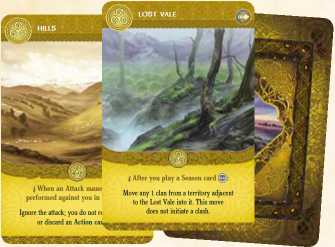
How to Acquire: During the Assembly phase, the chieftain of each territory takes its matching Advantage card.
Allowed to Keep: Once an Advantage card is in a player's hand, that player keeps it for the entire round until he chooses to play it.
Even if an effect causes him to no longer be chieftain of the matching territory, he still keeps the card in hand (and can play it) until the end of the round. These cards are not kept from round to round, but the same player can have the same Advantage card in back-to-back rounds as long as he is chieftain of that territory.
Epic Tales Cards
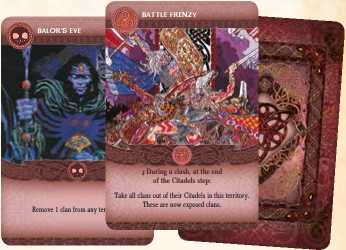
These cards evoke the Celtic gods and heroes, and they inspire the clans to accomplish legendary feats.
How to Acquire: These cards are drawn when certain game effects occur, such as the "Bard" Action card or when placing a new Sanctuary.
Allowed to Keep: These cards are kept from round to round until played.
Here is a list of all Epic Tale cards.
Card Details

Setup
In a 2- or 3-player game, return the Action
1cards that have a 4 in the bottom- right corner to the box; they are used only in a 4-player game.Each player chooses a color and places his 12 clan figures
2in front of him; this is his reserve.Place the Deed tokens
3, the Pretender tokens4and the Festival Marker5near the play area.Shuffle the Epic Tale cards
6and place them in a facedown pile.Shuffle the territory tiles
7and place them in a facedown stack near the play area.Draw a number of territory tiles
8equal to the number of players and place them faceup and interlocked to each other at the center of the play area. Each tile must be adjacent to two other tiles. Search for the Advantage cards9that match the territories in play and place them faceup near the play area so that each card is visible. Place the other Advantage cards10in a facedown pile.Give the Brenn marker
11to a random player.The Brenn chooses one territory to be the Capital and places the plastic Capital
12and one Sanctuary13there.The Brenn flips the Flock of Crows token
14like a coin. The faceup side indicates the direction of turn order at the start of the game.Starting with the Brenn and proceeding in the direction indicated by the Flock of Crows token, each player in turn places one clan in any territory until each player has two clans somewhere on the board.

Discovery Scenario
For your first game of Inis, we recommend that you play the discovery scenario. The rules are unchanged, but you must set up the game as follows:
Instead of drawing territory tiles to create the starting play area, use these territories:
2 players: Valley and Cove
3 players: Valley, Cove and Plains
4 players: Valley, Cove, Plains and Hills.
Before creating the stack of territory tiles, search for these tiles: Meadows, Misty Lands, Forest, Gates of Tîr Na Nóg, Highlands and Mountains. Shuffle these tiles and place them facedown to create the bottom of the stack.
Shuffle the remaining tiles and place them on top of the stack.
Territory Chieftain

The chieftain is an important concept used by several game effects.
The player who has the most clans in a territory is chieftain of that territory. In case of a tie, that territory has no chieftain.
Game Play
The game is played over a series of rounds, and each round consists of two phases:
Assembly Phase: The Brenn is appointed, victory conditions are checked, turn order is set, chieftains take Advantage cards, and players draft Action cards.
Season Phase: This is the core of the game, during which players perform various actions and effects by playing cards from their hand.

Phase 1: The Assembly
Complete the following six steps in order:
-
Chieftains' Business
Assign Brenn
The chieftain of the Capital territory becomes the Brenn and takes the Brenn marker.
If the Capital territory does not have a chieftain, the Brenn does not change- even if none of the current Brenn's clans are present in the Capital territory. The Brenn can change only at this time, not during the Season phase.
-
Check for Victory
Check to see if a player has won. Victory conditions are explained further on page 10.
Players return all Pretender tokens to the supply, if they had some.
-
Take Advantage Cards
The chieftain of each territory takes that territory's matching Advantage card. If a territory does not have a chieftain, the Advantage card stays faceup near the play area.
-
The Oracles
Flip Flock of Crows Token
Important: Any game effect that refers to "next player" or "in turn order" uses the order shown on the faceup side of the Flock of Crows token.
-
Season Preparation
Deal Action Cards
For a 4-player game The Brenn takes all 17 Action cards, shuffles them, randomly sets aside one card facedown, and deals four cards to each player. For a 3-player game, same thing but there is only 13 cards because the ones that have a 4 in the bottom-right corner were returned to the box during the setup.
-
Action Card Draft (3-4 Players)
Each player looks at his four Action cards, chooses one to hold, and passes the other three to the next player, as indicated by the Flock of Crows token.
Next, each player adds the one card he held to the three cards passed to him. He looks at all four Action cards, chooses two to hold, and passes the other two to the next player.
Finally, each player adds the two cards he held to the two cards passed to him. He looks at all four Action cards, chooses three to hold, and passes the other one to the next player.
At the end of the Assembly phase, each player has four Action cards in hand and maybe some Advantage and Epic Tale cards.

Phase 2 : The Season
The Brenn begins the Season by playing the first card, which must be a Season card.
Then the next player has the choice to:
- Play a Season card
- Pass
- Take a Pretender token
This continues with each player in turn order doing one of the three options until all players have consecutively passed, which ends the Season phase. Then a new round begins with the Assembly phase.
Play A Season Card
A Season card may be an Action card an Advantage card or an Epic Tale card . The player plays the card, resolves the indicated effect, and then discards the card:
Action cards are discarded in a facedown discard pile. Players can look at the cards in this discard pile only when a card effect allows it, such as the "Druid" Action card.
Each played Advantage card is placed facedown near the play area with its card back visible.
Epic Tale cards are discarded in a faceup discard pile, and players can look at the cards in this discard pile at any time.
Pass
The player does not play any cards and simply passes. He will be able to play cards again if the turn comes back to him.
Take A Pretender Token
The player must meet at least one victory condition and cannot already have a Pretender token. He takes a Pretender token from the supply and places it in front of him. This token is kept until the Assembly phase, even if at a later point the player no longer meets any victory conditions.
Specific Situation
If A Player Has No Clans In Any Territories
If a player has no clans in any territories when his turn begins, he must discard a Deed token if he has one. Then, whether he discarded a deed token or not, he places a total of two clans in any territories. After that he can take his turn as normal: play a Season card, pass, or take a Pretender token.
End Of The Season
When all players have consecutively passed, the Season ends. Players keep all Epic Tale cards in their hands, but they must discard all Action cards. If a player has an Advantage card in his hand and he is no longer the chieftain of that territory, he places that Advantage card faceup near the play area.

Clashes
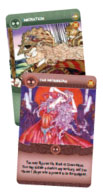
A clash  occurs when one or more clans are moved to a territory where any opposing clans are already present. Also, some card effects can cause clashes to occur without any clans moving. A clan that is "placed" in a territory (such as the "New Clans" Action card) does not initiate a clash.
occurs when one or more clans are moved to a territory where any opposing clans are already present. Also, some card effects can cause clashes to occur without any clans moving. A clan that is "placed" in a territory (such as the "New Clans" Action card) does not initiate a clash.
As a reminder, cards that can initiate a clash show this symbol in the top-right corner:
When a clash is initiated, the owner of the incoming clan is the "instigator". When it is a card that initiate a clash, the player who is the instigator is indicated on the card. Then the clans present in the territory need to decide among them how best to settle their differences-either aggressively or peacefully.
As soon as a clash occurs, players immediately resolve the clash before continuing on with the round.
If a single effect results in multiple clashes (such as the "Migration" Action card), the instigator chooses which clash to resolve first. After resolving the first clash, he chooses which clash to resolve next, and so on until all clashes have been resolved.
Check here for more information about resolving clashes.

Victory Conditions

There are three victory conditions. Each player can meet several victory conditions.
During Step 2 of the Assembly phase, Check for Victory, players check to see how many victory conditions each player with a Pretender marker currently meets.
The Victory Conditions
Chieftain over Six or More Opposing Clans: Add up the total number of opposing clans in territories where the player is chieftain. If there are six or more, the player has met a victory condition.
Present in Territories with Six or More Total Sanctuaries: Add up the total number of Sanctuaries in territories where the player has one or more clans present (even if he is not the chieftain). If there are six or more, the player has met a victory conditions.
Present in Six or More Territories: Add up the total number of territories where the player has one or more clans present (even if he is not the chieftain).
If there are six or more, the player has met a victory condition.
The degree to which a player meets a victory condition is not important, but the total number of victory conditions met is important. For example, if two players meet the "territories" victory condition (one player being present in six territories while the other is present in eight), both are tied and equally considered to have met the victory condition.
Deeds
Players acquire Deed tokens by using cards like "Bard" or "Master Craftsman".
Players keep their Deed tokens in front of them and visible at all times. Each Deed token can act as a "wild" toward meeting any one victory condition by adding "1" to the number of specified requirements.
Each Deed can be used only once to complete a single victory condition.

End of the Game
During Step 2 of each Assembly phase, Check for Victory (and only at this time) players check to see if there is a winner.
If no player has a Pretender token, then there is no winner-even if players currently meet one or more victory conditions.
Otherwise, check the victory conditions of each player who has a Pretender token: The player who meets the most victory conditions wins! (He must meet at least one victory condition in order to win).
In case of tie for meeting the most victory conditions:
if the Brenn is among the tied players, he wins the game.
if the Brenn is not among the tied players, there is no winner. If there is no winner, all Pretender tokens are returned to the supply, and the game continues for another round, proceeding with the rest of the Assembly phase.
Rules For Two Players

In 2-player games, the Flock of Crows token is not used except for resolving the Gates of Tír Na Nóg's territory effect. Do not forget to remove the Action cards with a 4 , in the bottom-right corner, as they are not used in a 2-player game.
During the Assembly phase, replace Steps 5 and 6 (the drafting rules) with the following:
Shuffle all Action cards and randomly set aside one card facedown.
The Brenn deals three cards facedown to each player.
Each player looks at his three Action cards, chooses one to hold, and passes the other two to his opponent.
Each player looks at his three Action cards, chooses two to hold, and passes the other one to his opponent.
Each player places his set of cards facedown in front of him.
Once again, the Brenn deals three cards facedown to each player.
Just as before, the players draft this new set of Action cards as explained above.
At the end of the draft, each player has a total of six Action cards that were chosen in two drafts.
Glossary
Clan: One figure.
Chieftain: The player who has the most clans in a territory. In case of a tie for most clans in a territory, there is no chieftain. The chieftain receives that territory's Advantage card during the Assembly phase.
Assembly: At the start of each Season, the chieftains gather for an assembly where they divvy up the responsibilities that need to be fulfilled during the upcoming Season.
Brenn: The Brenn is a tribe leader who is chosen to guide all the tribes into the island. He is the highest authority until the High King is elected. The Brenn organizes the Assembly, acts first during the Season, and has a great advantage in case of a tie for victory. He is determined at random at the start of the game and can change over the course of the game.
Capital: The territory chosen by the Brenn at the start of the game. At the start of each Assembly, the Capital's chieftain becomes the Brenn.
Citadel: A fortified village. Citadels allows players to send their clans there to seek refuge and protection during clashes.
Sanctuary: A place of worship. Being present in territories with Sanctuaries is one of the three victory conditions, and placing new Sanctuaries in a territory allows a player to draw an Epic Tale card.
Present in a Territory: A player is present in a territory if he has one or more clans there.
Attack: One of the maneuvers that a player can choose during a clash.
Instigator: The player who initiated a clash, typically after moving some of his clans into a territory.
Continue Reading

